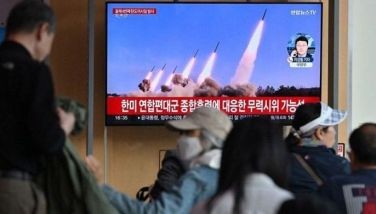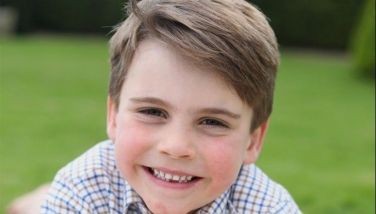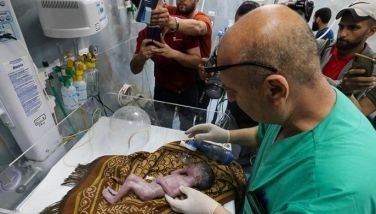WHO's next Africa chief is elected
COTONOU — As Ebola continues to burn its way through three West African countries, the World Health Organization on yesterday elected its next Africa director, a doctor from Botswana who is a longtime veteran of the UN agency.
WHO's next Africa director, Matshidiso Moeti, was the deputy regional director for Africa until March. WHO reported the first cases in the current outbreak on March 23. The circumstances of her departure from the deputy position were not immediately clear.
After the election results were announced in a WHO meeting in Benin, Moeti expressed optimism that the outbreak will be under control within three months. It has killed nearly 5,000 people and is by far the worst-ever outbreak of the dreaded disease, for which there is no cure.
"I hope that the (Ebola) situation will be improved by the time I take office in February 2015," Moeti told journalists. She said the health systems in Sierra Leone, Liberia and Guinea have been devastated and would need to be rebuilt and that readiness for any future Ebola outbreak must be improved, including warning systems and monitoring capabilities.
In Sierra Leone, where the epidemic is currently particularly strong and where treatment centers are urgently needed, one built by Britain finally opened outside the capital yesterday. The center in Kerry Town includes an 80-bed facility to be managed by Save the Children and a 12-bed unit, which will expand to 20 beds over the coming months, for health care workers and international staff who become infected by Ebola. This smaller one will be staffed by British army medics.
A US-built facility for health care workers was also being inaugurated yesterday in Liberia. The need is particularly severe in Sierra Leone.
"Sierra Leone does not have enough hospital beds to cope with the scale of the Ebola crisis," said Justine Greening, Britain's international development secretary. "Patients are being turned away from hospitals, reducing their chance of survival and allowing the disease to spread."
Representatives from WHO's 47 African member countries voted in a secret ballot for the regional director. Elections in UN organizations give member countries a say in who the leader is.
The outgoing Africa leader, Angolan doctor Luis Sambo, was criticized for overseeing a bungled response to the biggest Ebola outbreak in history.
In an internal draft document obtained by the Associated Press last month, WHO blamed its staff in Africa for initially botching the response to Ebola.
Dr. Donald A. Henderson, who ran the agency's smallpox eradication program in the 1970s, said WHO offices often lack accountability and that past elections were based on political trade-offs, not merit.
In her campaign brochure, Moeti listed her priorities, including tackling emerging threats and building a responsive, effective WHO.
Moeti previously led the epidemiology department in Botswana's Health Ministry as well as its AIDS department and joined WHO Africa as a regional adviser for women's and adolescent health. She was previously head of WHO's Malawi office.
Aboubakar Sidiki Diakite, inspector general for Guinea's health ministry, welcomed the election as an opportunity for reform.
"A change always brings new impetus," he told the AP in Paris this week. He said the new director would find "weaknesses" in the system that need to be remedied.
The response to the Ebola outbreak still desperately needs more resources. Britain's Department for International Development, which funded the Kerry Town center, says there are only 326 treatment beds in Sierra Leone. This is in a country that has routinely reported around 350 cases per week over the last several weeks.
That's worrying because the key to stemming the outbreak is getting sick people out of their homes and into treatment centers where they can no longer infect others. Ebola is transmitted through contact with bodily fluids.
The Kerry Town center, built of wood framing covered by white material, also hosts a laboratory run by British scientists. It is the first of six centers that Britain plans to build.
Australia's prime minister said yesterday that his government expects to staff a British-built Ebola hospital in Sierra Leone by the end of the month. Prime Minister Tony Abbott said Australia made the decision after Britain guaranteed it would treat any Australian health worker infected with Ebola.
WHO says 500 foreign and 4,000 national health workers are still needed. More than 500 health workers have become infected, reducing their ranks and making it difficult to recruit more.
Foreign medical staff who have been infected have been evacuated for excellent treatment abroad, so to encourage confidence among national staff that they will receive quality care, centers dedicated to health care workers are beginning to open.
A Ugandan man who became infected while working for an Italian aid group in West Africa has "significantly improved" since arriving in Germany on Oct. 3 for treatment, the University Hospital Frankfurt said yesterday.
Meanwhile, a Spanish nursing assistant who recovered from Ebola was discharged yesterday from a hospital in Madrid. Teresa Romero helped treat two Spanish missionaries who died of Ebola in August and September after they were flown back from West Africa.
- Latest
- Trending
































